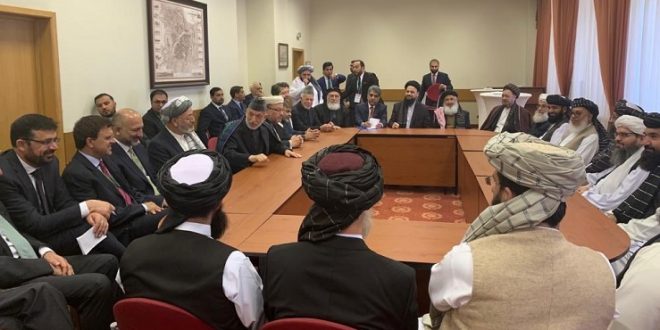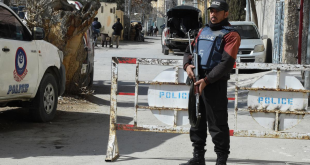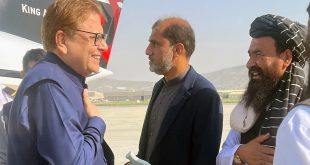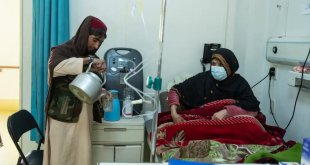AT News Report
KABUL: President Donald Trump’s sudden halt to US-Taliban talks seems to have worsened the situation in Afghanistan as the Taliban have embarked on threatening the US with “Jihad” and seizing more land across the country after the failed peace talks.
Now, with an agreement to end America’s longest war on hold, Afghanistan suddenly faces a presidential vote amid warnings that it’s not ready — and the threat of even more violence. This comes as the Secretary-General’s Special Representative for Afghanistan,Tadamichi Yamamoto, during his briefing to the United Nations Security Council on Tuesday said that under the current circumstances, it was imperative that the direct talks between the Islamic Republic of Afghanistan and the Taliban commenced at the earlier possible.
Below is the full text of his speech atthe UNSC:
“Mr. President,
Members of the Security Council,
The events of recent days and weeks have shown, more than ever, the urgency of finding a political settlement to the long Afghan conflict. Efforts over the past year produced opportunities for peace. This created hope, but also fear for many. But one point remains clear: conflict can only be resolved by direct talks between Afghan people. These talks must be inclusive, representing the whole spectrum of Afghan society.
It is imperative therefore that direct talks between the Islamic Republic of Afghanistan and the Taliban commence as soon as possible. Many efforts have been made for this purpose working with Afghan parties. Those efforts have created an opportunity where the beginning of direct talks between the two Afghan parties seems to have come within reach. Yet, often, the period just before coming to an agreement is the most difficult phase. All those who are concerned with peace efforts, above all the parties to the conflict, need to continue to work to bring about direct talks. I call on the parties to continue to seize opportunity of direct talks so that a peaceful future could be built.
I have listened to many Afghan people from across the country who expressed their hopes and fears about the future. They hope for an end to the conflict, but they also fear that peace might come at the sacrifice of freedom and rights which the country has striven to protect and advance for the past 18 years. Many young people, especially young women, are worried about future restrictions to their participation in the socio-economic and political life of their country. Any political settlement must include a promise to continue to protect and advance human rights and fundamental freedoms for all who live in Afghanistan, including those of women, youth, and minorities, as well as the freedom of expression and the media. Another important achievement over the past 18 years, which needs to be maintained and further promoted, is the institutional capabilities of the state including in the areas of security and service delivery.
The recent informal talks between representatives from Afghan society and the Taliban in Moscow and Doha gave opportunities for dialogue to address some key issues needed for peace. I hope that this experience will be carried forward and help deepen dialogue for constructive outcomes. The United Nations stands ready to support an intra-Afghan process, drawing on our impartiality and expertise.
I also wish to point out that peace efforts need to address and bring about a reduction in violence and eventual ceasefire.
Finally, the support of the countries in the region and beyond remains critical. Their active engagement and support to peace efforts will be essential going forward, particularly from neighboring countries who have most to gain from peace and stability in Afghanistan.
On 28 September, the people of Afghanistan are scheduled to head to the polls in the fourth presidential election since 2001. The country would make another step in strengthening the foundation of a representative democratic political system. The United Nations supports fully the efforts of the Independent Election Commission, IEC, and Electoral Complaints Commission, ECC, security institutions, civil society, and above all, candidates, their supporters and voters to conduct credible and inclusive elections on schedule. Credible elections would provide an important political foundation for the future of the country as well as legitimacy and authority to the elected President, which would be particularly important in view of the expected peace process.
As for the technical and operational preparations for the elections, which are led by Afghan institutions, things are so far on track. The ballot papers and other voter materials are being delivered to provinces and districts. The recruitment and training of polling staff is ongoing. The timely rollout of electronic technology is being managed by the IEC. The voters list has been updated and over nine million records have gone through the public display and corrections process. These are some examples of reforms which reflect lessons learned from last year’s parliamentary elections. These and other measures will go a long way to improve key aspects of fraud mitigation measures designed to increase the transparency and credibility of the vote. Our United Nations advisers are working hand in hand with the electoral management bodies during these last weeks and days of intense preparations.
However, concerns still remain ahead of the elections. One is security, another is voter turnout, and the other is possible fraud and irregularities. There are serious efforts underway by Afghan security institutions in collaboration with international partners to ensure adequate security arrangements during the preparations and for the polling day. However, we still hear much anxiety expressed by Afghan citizens particularly in view of the Taliban’s stated threat to disrupt the electoral process, especially by targeting civilians participating in the elections. Attacks directed against polling centres and civilians participating in the electoral process are unacceptable; they are clear violations of international law. I urge the Taliban to retract their threat, and I urge the Government to provide adequate security arrangements to safeguard the electoral process.
Voter turnout is important for elections. 9.6 million people have registered. Voter turnout could be negatively affected by security, but also by the general interest of voters. Through our field offices, we have a sense that interest in the elections is not as high as it could be. This may be partly because there have been stronger interests in the peace process, but also because campaigns which started on 28 July have not picked up full momentum. I appeal to Afghan citizens to exercise their right to vote. The electoral bodies and candidates also need to call upon people to come out and vote.
Another challenge, which could affect credibility, is the issue of fraud and irregularities, which includes the need to provide a level playing field for all candidates. In this regard, I should like to point out that the best technical preparations cannot substitute the political commitment to play by the rules and accept the results of the elections.
Candidates, political parties, civil society and the media all have the ability to field monitors to the process on election day, so I call on all stakeholders to obtain accreditation with the IEC in order to be present in every polling station. I also urge all actors to refrain from taking actions that could give any candidate undue advantage or call into question the legitimacy and credibility of the process. I encourage all stakeholders to bring cases of alleged violations to the relevant bodies, including the ECC.
The most difficult choice for candidates, politicians, after elections is to accept defeat, but it is the supreme act of statesmanship in a democratic process. All technical and operational efforts are put in place to make the presidential election credible. I appeal and urge all candidates and supporters to respect the democratic process to reach an outcome acceptable for the people and the country.
Efforts for peace should be accompanied by a reduction in violence; yet, violence has intensified in recent days. Recent attacks by insurgents in Kunduz, Baghlan, and Farah, and above all multiple attacks in Kabul are of serious concern. Trying to obtain the position of strength in negotiation cannot be an excuse for the escalation. The parties to the conflict must reduce violence and civilian casualties to demonstrate their seriousness for peace.
I am much troubled by the continuing high number of civilian casualties by these attacks. In particular, I must point out that deliberate targeting of civilians is a matter of grave concern, and it is a war crime. The rising number of civilians killed during search operations and air strikes is also of concern. I urge all parties to review the way they conduct their operations, to protect civilians and to minimize harm caused.
In this relation, I express strong concerns over continued harm to civilians caused by the Islamic State in Iraq and the Levant-Khorasan Province (ISIL-KP), which is showing a sign of unabated and persistent intension to expand its influence.
While the search for peace goes on, let us not forget the millions of people across Afghanistan who suffer the consequences of conflict. UN agencies and non-governmental organisations currently work in 331 of the country’s 400 districts, in particular in the areas of agriculture, education and health. Their access and reach offers short-term relief and also the building blocks for a better future.
At the same time, it is never too early to start thinking about how to assist people post-peace, and also while peace is negotiated. The international community has already embarked on a study of post-peace assistance led by the World Bank in collaboration with the United Nations and countries such as the United Kingdom. International assistance and mutual commitment with Afghanistan – starting in the ministerial meeting in Tokyo in 2012 through London, Brussels and Geneva – will need to be reviewed to meet new requirements and situations brought about by peace. The United Nations as the co-chair of the 2018 Geneva Ministerial Conference is conscious of the need to work vigorously in this area and we stand ready to work with the next co-chair of the 2020 Ministerial Conference, who is yet to be chosen.
I cannot stress enough the importance of advancing efforts for delivering peace; concretely the start of intra-Afghan negotiations. Examples from past peace negotiations from around the globe show that as the prospect for substantive talks becomes real, the challenges will become greater. The final stages leading to the start of intra-Afghan talks become more difficult and require delicate handling. They require cooperation from all of us. The United Nations commends the efforts of all those concerned to bring about direct talks between the Islamic Republic of Afghanistan and the Taliban and we in the United Nations will continue to assist such efforts.”
 Afghanistan Times
Afghanistan Times




